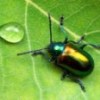Josh King writes in with the following:
Subject: Arthropod specimens available for analysis from large experiments in long-leaf pine forests.
We have material from 8100 pitfalls available for anyone (including enterprising students or post-docs) interested in studying the effect of disturbance or fire ant invasion on ground-dwelling arthropods in a variety of habitats.Â
We simply do not have the time to sort this material any time in the near future and we would prefer it not languish on a shelf for decades. The majority of this experimental work was conducted in and near the Apalachicola National Forest in northwestern Florida. This forest is known for its diversity of plants and animals including some of the highest floral diversity in any temperate zone plant communities and important, endangered species such as the red-cockaded woodpecker.
The project consisted of three field experiments in northern Florida: one in natural, pine flatwoods habitat, one in grassy, seasonally flooded pine flatwoods, and one in cattle pasture. We established a total of 75 40x40 m plots, and serviced each of these twice or more times annually to maintain them in the desired condition, killing âillegalâ fire ant colonies or replacing vanished colonies. We surveyed and sampled the resident ant communities using 36 pitfall traps in each plot in the summers of 2004, 2005 and 2006.
The primary focus of this project was to assess the effects of invasive fire ants and habitat disturbance on native ants. All of the ants have been removed from samples but there is a huge diversity of arthropods remaining. We are seeking individuals who are interested in sorting and identifying individual taxa, or preferably, a general survey of arthropod taxa. In return we ask that we be included as co-authors on any resulting publications. The relevant publications from this study are listed below and include details of experimental design and sampling techniques. We would like to have any arrangements to sort the material settled within the next few months, if at all possible. Please contact both of us if you are interested.
King, J. R. and W. R. Tschinkel. 2006. Experimental evidence that the introduced fire ant, Solenopsis invicta, does not competitively suppress co-occurring ants in a disturbed habitat. Journal of Animal Ecology 75: 1370-1378.
King, J. R. and W. R. Tschinkel. 2008. Experimental evidence that human impacts drive fire ant invasions and ecological change. Proceedings of the National Academy of Sciences 105: 20339-20343.
Tschinkel, W.R., J.R. King. 2007. Targeted removal of ant colonies in ecological experiments, using hot water. Journal of Insect Science 7:41.
